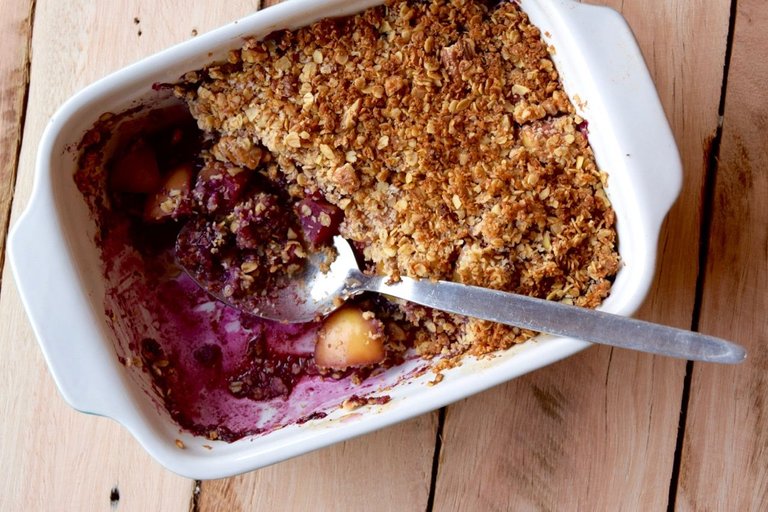
Hello!
I wrote this post back when Spring had just arrived in South Africa a couple of years ago. As I eagerly await the arrival of spring here in the Northern Hemisphere, I long for the warmer, sunnier weather that brings about lazy weekends spent outdoors, and afternoon braais (barbeques, for all of you non-South Africans) with family and friends. The change in season also brings about new fruits and flavours to incorporate into our food, and this wholesome take on the classic apple crumble makes use of a variety of fresh fruit, with a little bit of fruit juice for sweetness, and a crumble topping that includes oats, nuts, and honey. You'll end up with a soft filling with the most delicious golden crust. In fact, you can keep the leftovers, if there are any, and enjoy them with plain yoghurt for breakfast the next day :) Before I share the recipe, here's a little bit of info about two of the main ingredients.
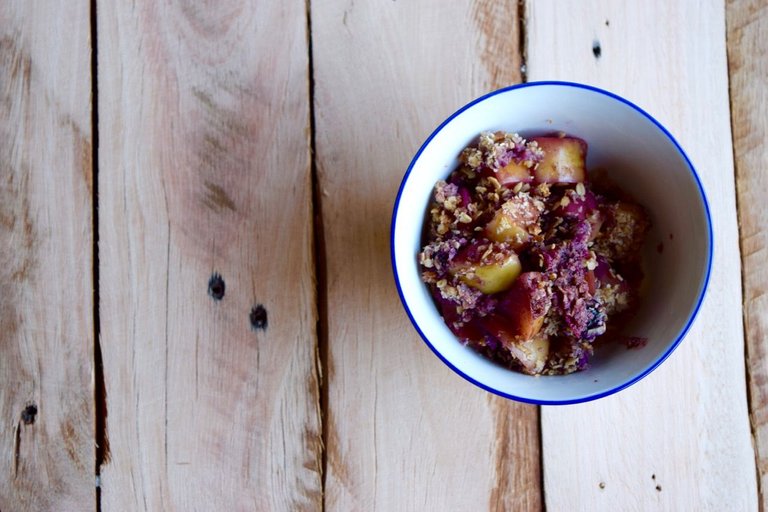
BLUEBERRIES
The antioxidant capacity of fruits and vegetables became an area of ever-increasing interest following numerous studies that have shown a relationship between an increased fruit and vegetable intake and a lower risk of developing a number of degenerative diseases [1]. This protective effect of plant foods has largely been attributed to their phytochemical antioxidant content, and their ability to protect biological systems (such as our bodies) against damage that can be caused by oxidative stress [1]. Our bodies are able to produce their own antioxidants to protect us against inflammation, infection, premature ageing, and heart disease, however, we still need to give them a bit of a boost by eating antioxidant-containing foods [2]. An increased intake of antioxidant-containing fruits and vegetables has been shown to benefit heart health, improved eyesight, and better memory [3].
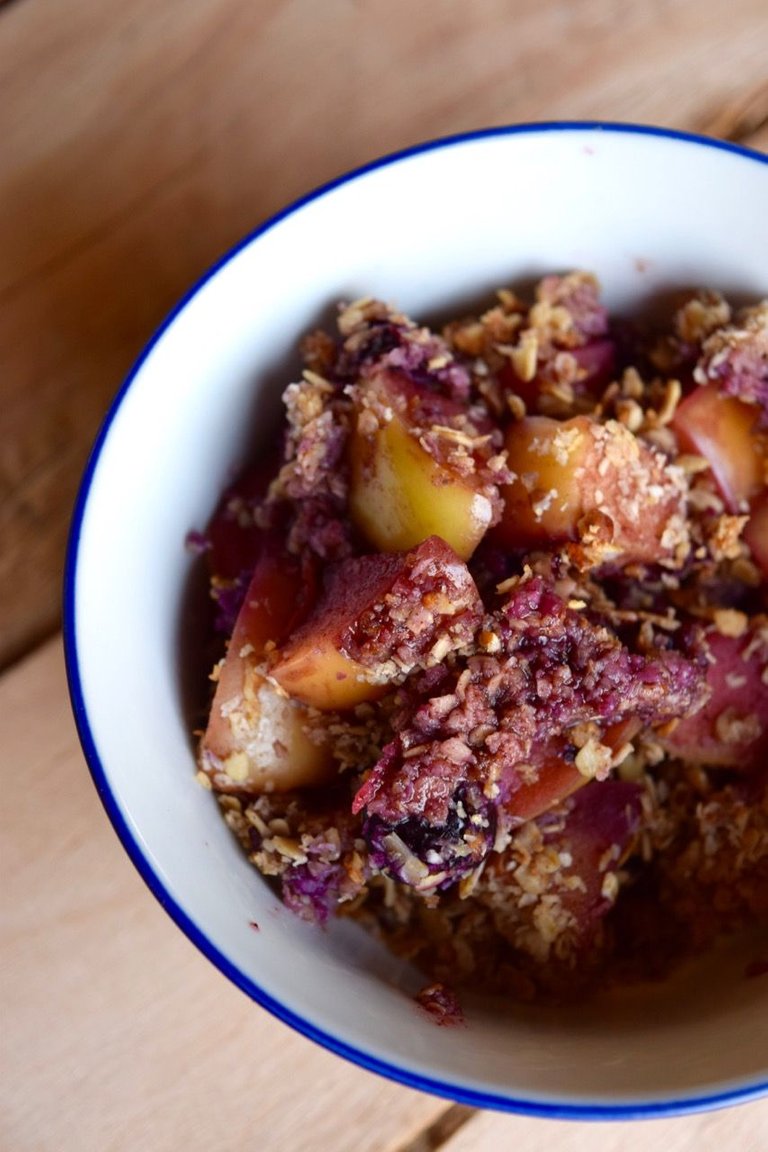
So how does this relate to blueberries? Well, when compared to many other fruits and vegetables, blueberries have been ranked as one of the best in terms of antioxidant content [3]. Despite many years of research, the role that blueberry phenolics play in antioxidant defence within the body still remains unclear, however, there is still much interest in determining the exact role that this berry plays in promoting health and preventing disease. In addition to beneficial antioxidants, blueberries provide a variety of essential vitamins and minerals, most notably vitamin C, thiamin, riboflavin, niacin, potassium, and copper [3]. One cup of blueberries can provide 31 percent of the DRI for vitamin C, 16 percent for dietary fibre, and 7 percent for vitamin E [4].
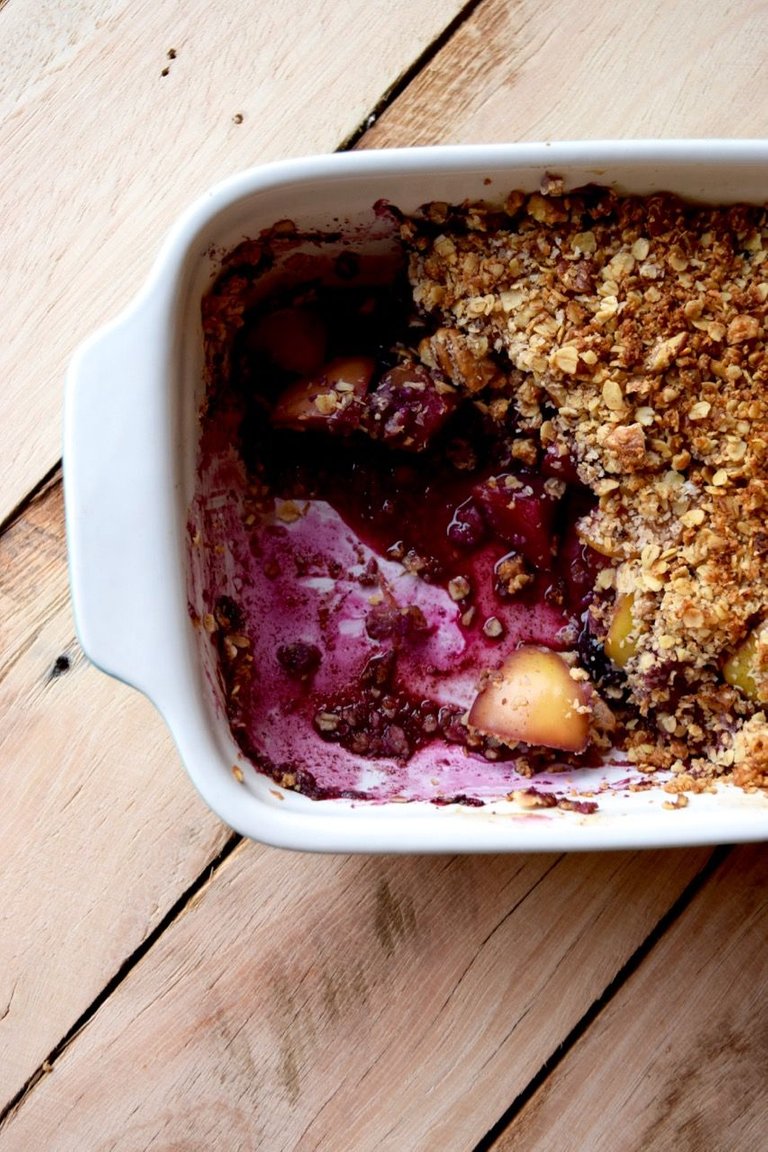
Blueberries were traditionally dried and used to combat diarrhoea and food poisoning from as early as the Middle Ages [2]. Today, medical research has shown that such remedies have a scientific basis, as blueberries contain anthocyanins, which act as antibacterials against bacteria such as E. coli, which cause of many gastrointestinal disruptions [2]. Furthermore, blueberries may help combat recurrent cystitis, which is caused by bacteria that travel up the urethra into the bladder, causing inflammation and infection that can be incredibly uncomfortable [2]. Blueberries contain substances that prevent infectious bacteria from adhering to the mucous membranes of the urinary tract, stopping them from travelling up the urethra and into the bladder, thus preventing infection [2].
On the culinary side, blueberries are naturally quite sweet, and thus do not need to be cooked with lots of sugar to make them tasty to eat, unlike many other berries that can be incredibly tart and hard to eat on their own [2]. Blueberries are small and firm, with a blue-black skin and a light interior [5]. They are delicious when eaten with some fresh plain yoghurt and homemade granola, in smoothies, in baked goods, and even as an addition to a fresh salad. If you want to watch a cool video about some more interesting ways that you can use blueberries, check out this link.
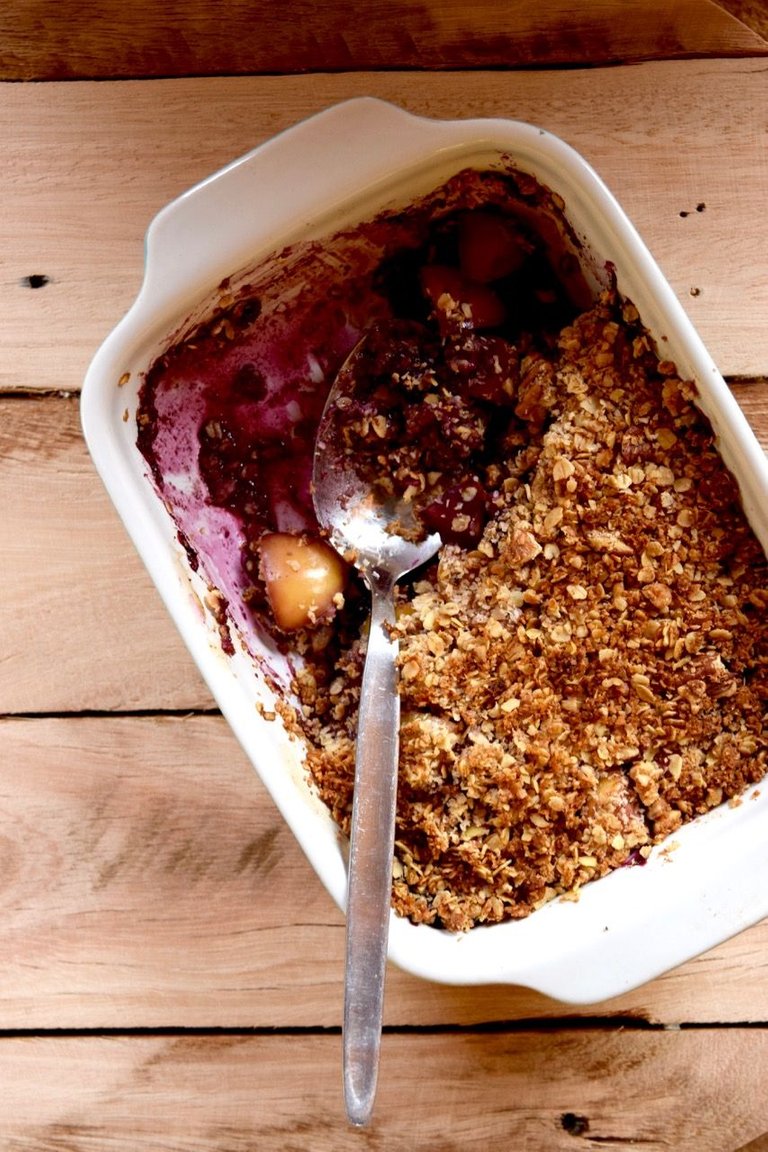
APPLES
An apple a day keeps the doctor away, right? Have you ever wondered why this old saying rings true? Depending on the freshness and variety, apples are a good source of vitamin C, which plays a role as an antioxidant in the body and helps to keep your immune system in check [2]. Apples have been recommended for ages as a remedy to combat constipation, thanks to their dietary fibre content, containing both soluble and insoluble fibre [2]. Numerous studies have been done on apples and have associated them with reducing the risk of insulin resistance and type 2 diabetes, weight management, preventing the development of heart disease, promoting gut health, and managing cholesterol levels.
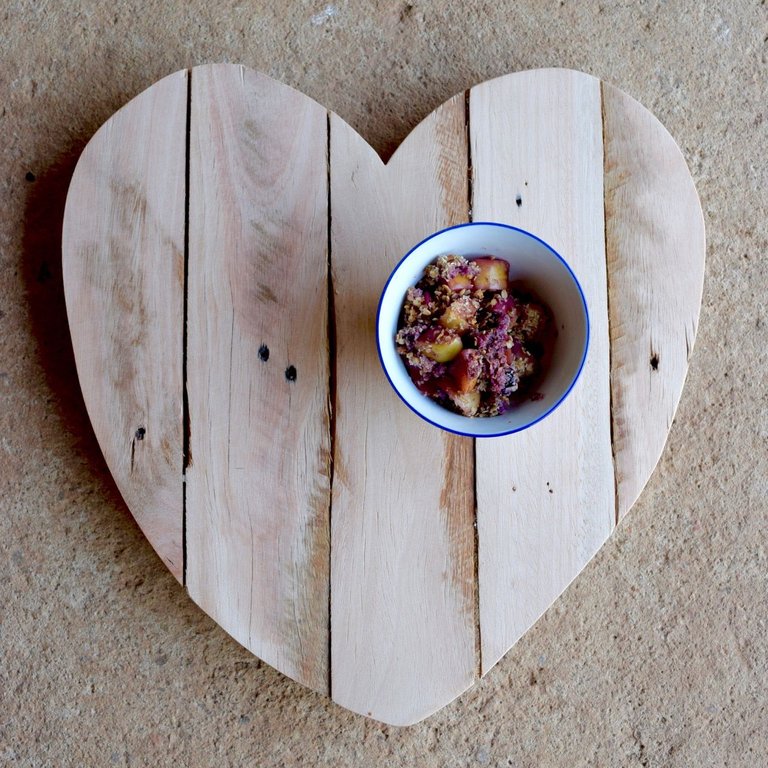
An apple is one of the best healthy snacks. Although experts agree that excessive consumption of sugar is one of the major contributors to obesity, and low-carb dieters everywhere are actively avoiding eating fruit at all cost, I don't believe that whole, fresh, unprocessed fruits should be placed in the same category as sweets, fruit juice, and sugar-sweetened beverages. As explained in this New York Times article, fruits contain a bounty of beneficial antioxidants and healthful nutrients, and their cellular structure, which is largely composed of what we know as dietary fibre, makes us feel full, helps to maintain healthy bowel function, and provides numerous metabolic benefits [6]. In fact, the fibre that makes up the bulk of a fresh apple helps to slow down the absorption of the sugars contained in the fruit, giving the body more time to metabolise them than if you consume processed fruit juice [6].
Apples are one of the most abundant fruits and can pretty much be found on supermarket shelves and at farmer's markets at any time of the year. Apples are convenient, flavoursome, versatile, and affordable, making them one of the most commonly appreciated fruits out there [5]. Apples can be eaten raw or used in a variety of different cooked and baked dishes, such as this crumble. It's always a good idea to wash apples just before consumption or use to remove any pesticide residues that may be present, but don't peel them as their peels contain a lot of beneficial dietary fibre.
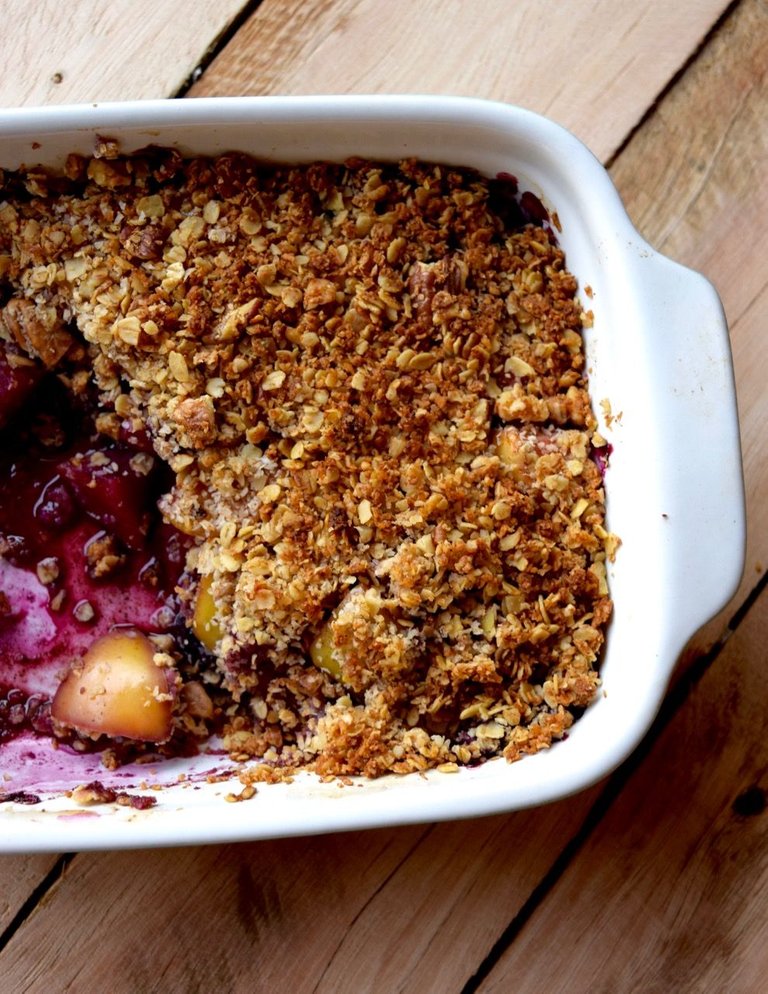
Ok, so now it's time to share the recipe :) It's served me well at a number of braais and get-togethers with friends, so I hope that you enjoy it! If you give it a try remember to tag @tasteandseeblog or use #tasteandseeblog so that I can check it out :)
Recipe
Ingredients
For the filling:
- 6 medium sized apples (pink lady, golden delicious, or granny smith are great)
- 1 cup 100% apple or pear juice
- 1 tsp vanilla extract/essence
- 1 tsp ground cinnamon
- Juice of 1/2 lemon (adjust to taste)
- 1 cup blueberries (fresh or frozen)
For the crumble topping:
- 1 cup rolled oats (look for certified GF if sensitive to gluten)
- 1 cup desiccated coconut
- 1 tsp ground cinnamon
- 1 tsp vanilla extract/essence
- 3 Tbsp honey
- 3 Tbsp coconut oil or extra virgin olive oil
- 1/2 cup pecans or almonds, roughly chopped
Method
Before starting, preheat your oven to 160˚C
For the filling:
- Wash the apples before chopping them into large wedges, removing the core, and leaving the skin on.
- Place the apples into a large pot, along with the apple juice, vanilla, cinnamon, and lemon juice.
- Cook over a medium heat for 25 minutes. Leave the lid on the pot for the first 10 minutes to allow the apples to 'sweat' a bit, and release moisture. Stir the mixture occasionally. Remove from the heat as soon as the apples become soft and start to collapse.
- Add the blueberries to the pot to the apple mixture after removing the pot from the heat. Mix together before transferring to a suitable sized baking dish.
For the crumble:
- Combine all of the crumble ingredients in a food processor and pulse until combined. If you don't have a food processor, just mix everything together until nicely combined.
- Sprinkle the crumble over the top of the filling.
- Bake in the oven for 30 minutes, until golden and crispy on top.
- Remove from the oven and serve whilst warm with some ice cream, yoghurt, or cream :)
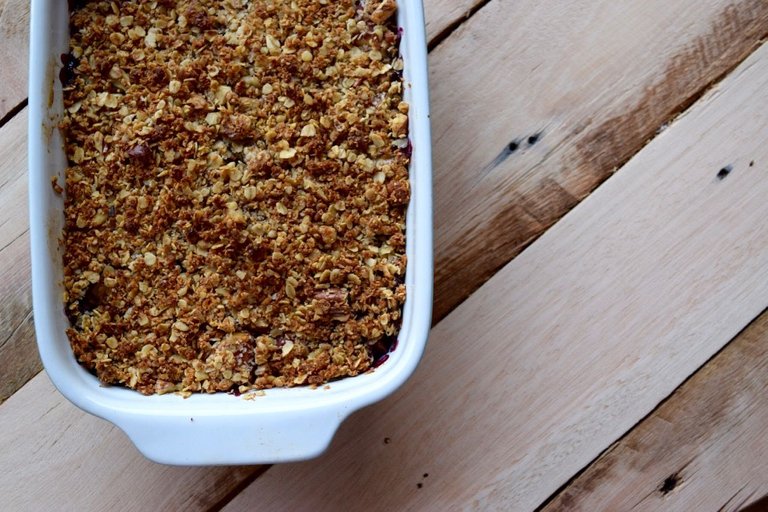
REFERENCES
[1] Kalt W, Joseph JA, Shukitt-Hale B. Blueberries and Human Health: A Review of Current Research. J Am Pomological Soc. 2007 Jul;61(3):151-60.
[2] Clasen L, Kramer P, McWhirter A, editors. Food's That Harm, Foods That Heal. 2nd ed. South Africa: Heritage Publishers (Pty) Limited; 2000. 400 p.
[3] Payne TJ. Formulating with Blueberries. Cereal Foods World. 2005 Sep/Oct;50(5):262-4.
[4] New World Encyclopaedia [Internet]. Blueberry; 2016 Jun 14 [cited 2016 Oct 2]. Available from: http://www.newworldencyclopedia.org/entry/Blueberry#Culinary_uses_and_health_benefits.
[5] Labensky SR, Hause AM, Priscilla AM. On Cooking. 5th ed. UK: Pearson; 2015.1219 p.
[6] Egan S. Making the Case for Eating Fruit. The New York Times. [Internet]. 2013 Jul 31 [cited 2016 Oct 2]. Available from: http://well.blogs.nytimes.com/2013/07/31/making-the-case-for-eating-fruit/?_r=0.
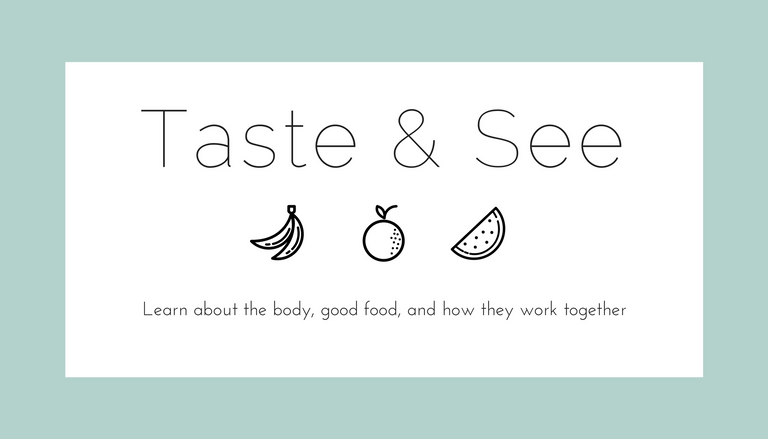
Looks great!
Thanks, @strangestwist! Appreciate the comment :)
Wow, I learned SO MUCH in addition to enjoying your fabulous recipe. This looks so delicious - and your photos are so crisp. I love it all.
You've been resteemed + followed as part of the #LadiesofSteemit initiative. Looking forward to keeping up with your posts!
Thank you @ladiesofsteemit! So exciting :) Really appreciate the resteem and follow x
Looks delicious, yum
:P Yummm
World of Photography Beta V1.0
>Learn more here<
Tuesday.
You have earned 5.05 XP for sharing your photo!
Daily photos: 1/2
Daily comments: 0/5
Multiplier: 1.01
Server time: 07:57:01
Total XP: 10.10/100.00
Total Photos: 2
Total comments: 0
Total contest wins: 0
Follow:
Join the Discord channel: click!
Play and win SBD:
Learn how to program Steem-Python applications:
Developed and sponsored by: Thank you for participating in #foodphotography, the weekly selection will be released on @photocontests@fairlotto@steempytutorials @juliank